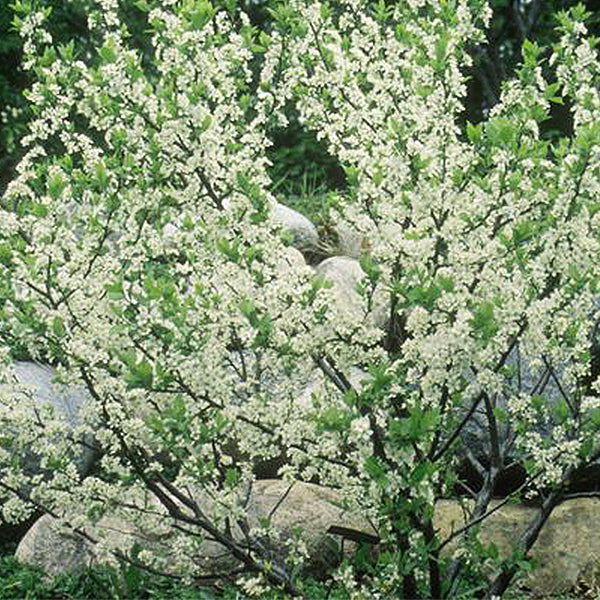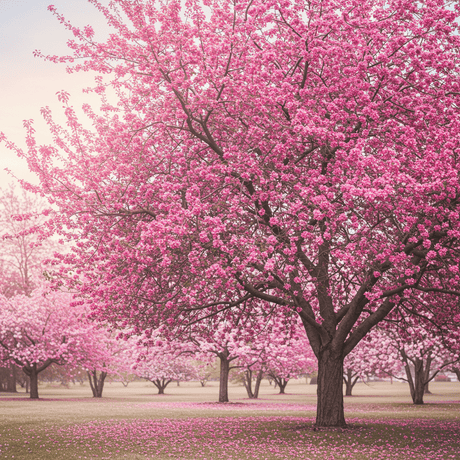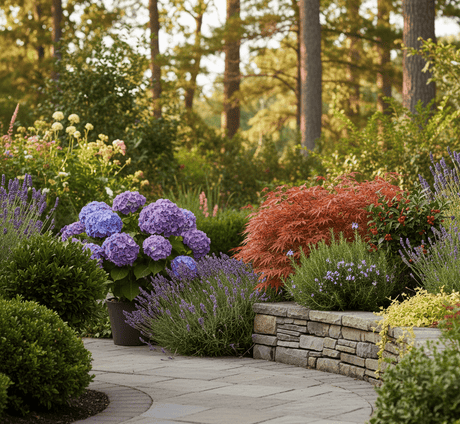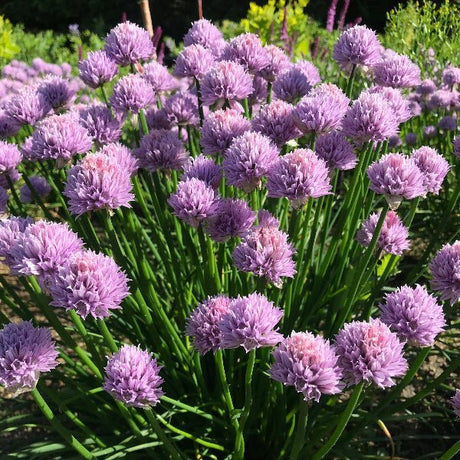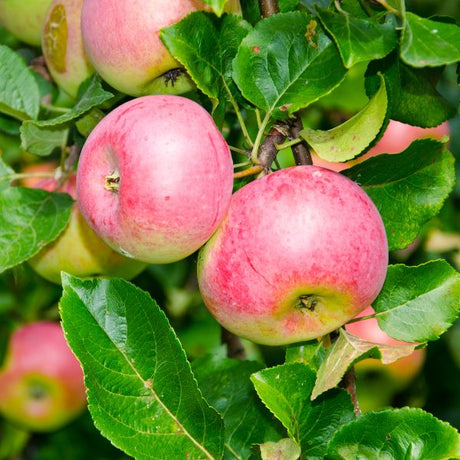Beach Plum Tree
Prunus maritima
- Stay Protected with Plant Sentry ™
Beach Plum Tree is backordered and will ship as soon as it is back in stock.
Plant Sentry™
Plant Sentry™

Plant Sentry™ Protected
Your order is protected by our compliance system that:
- Prevents restricted plants from shipping to your state
- Ensures plants meet your state's agricultural requirements
- Protects gardens from invasive pests and diseases
Delivery and Shipping
Delivery and Shipping
Delivery and Shipping
Fast, Safe Plant Delivery
Ships in 3-4 business days • Tracking provided • Weather protected
| Under $50 | $9.99 |
| $50 - $99.99 | $14.99 |
| $100 - $149.99 | $16.99 |
| $150 - $198.99 | $24.99 |
| $199+ | FREE |
✓ Zone-specific timing • ✓ Professional packaging • ✓ Health guarantee
Understanding Plant Options
Nature Hills offers plants in two main formats:
- Container Plants: Grown in pots with soil, sized by container volume and plant age
- Bare Root Plants: Dormant plants without soil, sized by height measurements
Container Plant Sizes
Container sizes indicate plant age and growing capacity rather than liquid volume equivalents. Our containers follow industry-standard nursery "trade gallon" specifications, which differ from standard liquid gallon measurements.
Young Plants (6 months to 18 months old)
| Container Size | Actual Volume | Metric Equivalent |
|---|---|---|
| 2" x 2" x 3" | 0.18 - 0.21 dry quarts | 0.20 - 0.23 dry liters |
| 4" Container | 0.31 - 0.87 dry quarts | 0.35 - 0.96 dry liters |
| 4.5" Container | 0.65 dry quarts | 0.72 dry liters |
| 6" Container | 1.4 dry quarts | 1.59 dry liters |
| 1 Quart | 1 dry quart | 1.1 dry liters |
| 5.5" Container | 1.89 dry quarts | 2.08 dry liters |
Established Plants (18 months to 2.5 years old)
| Container Size | Actual Volume | Metric Equivalent |
|---|---|---|
| 2 Quart | 2 dry quarts | 2.2 dry liters |
| #1 Container | 2.26 - 3.73 dry quarts | 2.49 - 4.11 dry liters |
| 5" x 5" x 12" | 3.5 - 4.3 dry quarts | 3.85 - 4.74 dry liters |
Mature Plants (2-4 years old)
| Container Size | Actual Volume | Metric Equivalent |
|---|---|---|
| #2 Container | 1.19 - 1.76 dry gallons | 5.24 - 7.75 dry liters |
| #3 Container | 2.15 - 2.76 dry gallons | 8.14 - 12.16 dry liters |
Large Plants (3-5 years old)
| Container Size | Actual Volume | Metric Equivalent |
|---|---|---|
| #5 Container | 2.92 - 4.62 dry gallons | 12.86 - 20.35 dry liters |
| #6 Container | 5.25 - 6.01 dry gallons | 23.12 - 26.42 dry liters |
| #7 Container | 5.98 - 6.53 dry gallons | 26.34 - 28.76 dry liters |
Bare Root Plants
Bare root plants are sold by height from the root system to the top of the plant. Plants may exceed minimum height requirements.
Common Sizes:
- Trees: 1 foot, 2 feet, 3 feet, 4 feet, 5 feet, 6 feet
- Shrubs & Perennials: 1 foot, 18 inches, 2 feet
Important Notes
Container Volume Specifications
- Trade Gallon Standard: Our containers follow industry-standard "trade gallon" specifications established by the American National Standards Institute (ANSI Z60.1) for nursery stock
- Volume Variations: Actual soil volume may vary due to plant root systems and growing medium settlement
- Age Indicators: Container size primarily indicates plant age and maturity rather than liquid volume equivalents
Growing Conditions
- Plant size can vary based on variety and growing conditions
- Container size helps indicate plant maturity and establishment level
- Larger containers generally mean more established root systems and faster landscape establishment
Seasonal Availability
- Bare root plants are available seasonally when dormant
- Container plants are available throughout the growing season
- Specific varieties may have limited availability in certain sizes
Questions?
For questions about specific plant sizes or availability, please contact our plant experts who can help you choose the right size for your landscape needs.
Plant Highlights
Beach Plum Tree highlights at a glance!
-
Botanical Name
-
Brand
-
Growing Zones3, 4, 5, 6
-
Growth RateModerate
-
Mature Height
-
Mature Width
-
Leaf Color
-
Flower Color
-
Fall Color
-
NativeYes
-
Pollinator FriendlyYes
-
Pollinator Required
-
Bloom PeriodEarly Spring, Late Spring
-
Harvest Time
-
FragrantYes
Characteristics
Where To Plant
When To Prune
- Late Winter
Water & Moisture Needs
- Moderate
Sunlight Needs
Soil Needs
- Well Drained
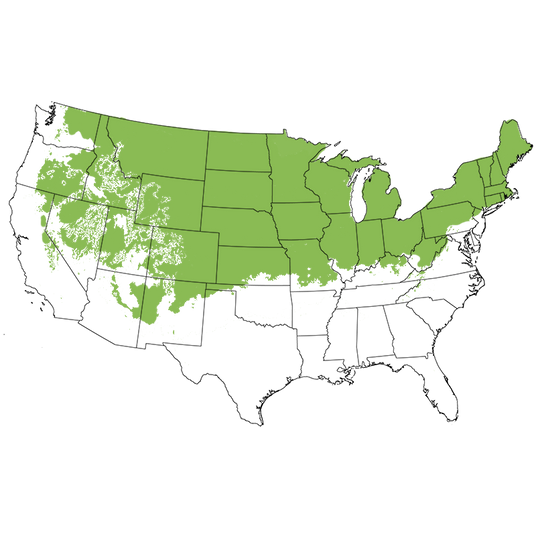
Growing Zones 3-6
A Jelly & Spirits Superstar Shrub
The Beach Plum (Prunus maritima) is a charming and rugged native fruiting shrubby tree naturally found along the Eastern Seaboard's dunes and sandy thickets. This round, dense shrub is a pollinator magnet, blooms profusely in spring, and produces small edible fruit in late summer.
Its white flowers appear in early May in sweet little clusters, occasionally turning pink after pollination. The foliage is green and glossy through summer, often turning golden or bronze in fall, while its gnarled branches give it winter interest. Growing up to 6 feet tall and just as wide, this suckering small tree or large shrub boasts a compact, mounding shape perfect for low hedges and wildlife gardens.
After flowering, the fruit sets in clusters, smaller than supermarket plums but packed with flavor. The tart, dusky purple fruit ripens in August and is famously used to make jams, jellies, sauces, cordials, and even infused in craft gin and vodka. Truly, a coastal treasure with culinary flair!
Since they are seed-grown and need cross-pollination, plant multiple shrubs or pair with other native Prunus species for better fruiting. Native to USDA Growing Zones 3 through 6, the Beach Plum is a fine choice for the forager, herbalist, or jelly enthusiast alike!
>>Jump to Planting & Care Instructions
Key Features
- Edible fruit ripens in August, ½–¾ inch round, purple, tart-sweet
- Dense, rounded native shrub with white spring blooms
- Low maintenance and drought-tolerant once established
- Pollinator-attracting flowers (especially Native Bees!)
- Perfect for jams, jellies, liqueurs, gin and vodka infusions
- Needs cross-pollination with another Beach Plum or wild-type Prunus
- Excellent for coastal, sandy, or acidic soils
Landscaping Uses
Use Beach Plum as a 4-6 foot tall and wide fruiting shrub with a round, dense habit. Beach Plums' suckering habit makes them excellent for stabilizing slopes or tucking into the wilder corners of an edible landscape.
- Native hedgerows, mixed shrub borders, or informal hedges
- Wildlife and pollinator gardens
- Dune restoration, erosion control, and slope stabilization
- Edible landscaping and coastal foraging gardens
- Mixed shrub plantings in naturalized or coastal designs
- Front-of-house native foundation plantings
- Rock Gardens
- Coastal and seaside landscapes
Care and Maintenance
This is a deciduous, seed-grown fruiting shrub that's both tough and tenacious. It's drought-tolerant, salt-tolerant, and sun-loving, but does its best with a little nurturing early on.
Beach Plums are well adapted to drought, coastal winds, and sandy, acidic soils, though they'll thrive best with decent drainage and moderately fertile loam.
- Planting Time: Spring or fall
- Sun Needs: Full sun (6+ hours daily)
- Soil Needs: Prefers well-drained sandy or loamy soils; slightly acidic pH ideal; avoid heavy clay
- Moisture Needs: Moderate moisture when young; drought tolerant once established
- Arborist Mulch: Apply 3-4 inches of arborist mulch to retain moisture and suppress weeds
- Fertilization Needs: Light annual compost top-dressing is often enough; avoid heavy feeding
- Pruning Info: Prune in late winter to remove dead/damaged wood and improve air flow
- Renewal Pruning: Every 3-5 years, thin out the oldest stems for rejuvenation
- Division Info: Not applicable; propagate by seed or layering
- Chill Hours: Requires 800-1000 chill hours for best fruit set
- Pollination Needs: Must cross-pollinate with another Beach Plum seedling or wild Prunus for fruit
- Special Needs/Perks/Growing Tips:
- Deer-resistant
- Tolerates salty air and soil, handles coastal wind
- Pest and disease-resistant
- Supports pollinators
Frequently Asked Questions
How do I get Beach Plum to produce fruit?
Beach Plums are not self-fertile. You'll need more than one genetically distinct plant, either two seed-grown Beach Plums or another native Prunus nearby, to ensure proper cross-pollination and fruit production.
Is Beach Plum good for pollinators?
Absolutely. The white spring blooms are a nectar source for native bees and beneficial insects, making it a great choice for pollinator-friendly landscapes.
Can Beach Plum grow in clay soil?
Not ideally. Beach Plum prefers sandy or loamy, well-drained soils and may struggle in heavy clay unless the soil is amended or drainage is improved.
How do I use Beach Plum fruit?
Make classic beach plum jelly, bake into tarts, or infuse into gin and vodka. The tart-sweet fruit is excellent for both sweet and savory recipes.
What other plants can I grow with Beach Plum for better yields?
Plant with other native plums or fruiting Prunus species, like Chickasaw Plum or American Plum.
Why Order From Nature Hills Nursery?
Nature Hills Nursery is committed to bringing the highest-quality plants to your door. Join thousands of happy customers and get all your planting needs at Nature Hills! We guarantee our plants for their first year! Check out lifelong support and landscaping ideas in our #ProPlantTips Garden Blog!

